Vitamin D is vital for immunity, muscles and bone and teeth health. Dr Hilary Jones explains what vitamin D does in the body, who is at risk of deficiency and what you can do to keep your levels topped up.
🕒 4 min read
Why do you need vitamin D, and what does it do in the body?
Vitamin D is essential for regulating the absorption and distribution of calcium and phosphate in the body, and therefore has a vital role in keeping bones, teeth and muscles strong and healthy.
It's important for reducing the risk and consequences of falls and is needed for the immune system to work properly.
The sunshine vitamin
Sometimes known as the sunshine vitamin, vitamin D is mainly produced by direct action of sunlight on the skin, where it is converted from cholesterol.
Unfortunately, during the autumn and winter months in northern countries such as the UK, the strength of UVB rays from the sun is insufficient for the skin to produce adequate levels. A rough rule is that if your shadow is taller than you are, you won't be producing enough vitamin D.
It's generally thought that between 10 and 15 minutes of exposure to the midday sun in the summer three times a week can provide enough vitamin D, but there are several factors that mean this is not always the case.

If your shadow is longer than you are tall, it's likely you're not producing enough vitamin D.
Who is most at risk of deficiency?
Many people are unable to get out and about because they are frail or housebound. Those living in care homes or other institutions are more vulnerable to vitamin D deficiency.
People who wear clothes that cover most of their skin are also at risk, as are those from African, Afro-Caribbean or South Asian backgrounds, as the pigment in their skin reduces vitamin D production.
Others who wear sunscreen or sun-blocking cosmetics, important at any time of year, are also at risk of deficiency for similar reasons. What's more, the further you are from the equator, the more UVB radiation from the sun is absorbed by the ozone layer.
Vitamin D deficiency symptoms
Lack of vitamin D can lead to bone deformities in children, as well as rickets. In adults the bone changes are known as osteomalacia. Adults may complain of a general sense of tiredness, with vague aches and pains along with an overall feeling of being unwell. Bones may feel tender under moderate pressure – often more noticeable in the ribs or shinbones.
Lack of vitamin D can also reduce immunity, so that individuals are more prone to frequent infections and colds. Some scientists believe that there is a correlation between the distance we live from the equator, lack of sunshine, lack of vitamin D and multiple sclerosis, which is more prevalent in northern geographical areas.
How many of us are deficient?
The UK National Diet and Nutrition Survey assesses the diet, nutrient intake and nutritional status of the general population, aged over 18 months and living in private households.
A blood serum concentration of 25-hydroxyvitamin D of below 25 nmol/l is generally considered to be a measure of deficiency. This means that 23% of 19 to 64-year-olds and 21% of those over 65 are deficient in vitamin D.
In the winter months the situation is even worse, with those figures rising to 40% and 29% respectively. All adults should consider taking a vitamin D supplement each day, especially in the colder months.
How much vitamin D do we need a day?
Much depends on our baseline levels, but the current recommendation is that during the autumn and winter months everyone over the age of one should have at least 10µg (micrograms) per day – sometimes written as 10mcg.
This figure can also be expressed as international units, where 1µg = 40iu, so 10mcg = 400iu. This recommendation also covers breastfeeding and pregnant women.
Babies, unless they are consuming more than 500ml of infant formula a day, and children between one and four years old are at higher risk of deficiency: the NHS recommends that breastfed babies who have less than 500ml of vitamin D-fortified formula a day should take an 8.5µg-10µg daily supplement, and children between 1 and 4 years old should take a 10µg daily supplement.

Vitamin D3 10µg
Benefits of vitamin D for 4p a day
- Supports your immune health, bones, teeth and muscle function
- Easy-swallow tablets containing 400iu (10µg) vitamin D3
- UK Government advises vitamin D supplementation during autumn and winter
Getting vitamin D from your diet
Although some foods contain vitamin D, it's difficult to obtain enough purely from your diet. Foods rich in vitamin D include oily fish such as salmon, sardines, herring, mackerel and tuna. Other sources include red meat (pregnant women should avoid liver due to the vitamin A content), egg yolk, fortified spreads, and cereals.
This is why nutrition professionals and the National Institute for Health and Care Excellent (NICE) recommends that adults take a daily 10µg vitamin D supplement in the autumn and winter.
In the past, cod liver oil was the supplement of choice for vitamin D, but not everyone gets on with the taste and aftertaste. Vitamin D tablets, which are available in vegan formulations, are a simple and cost-effective way to get your dose.
Safety factors when taking vitamin D supplements
There are certain precautions to bear in mind when taking vitamin D supplements. Anyone taking too much for too long could risk seeing a rise in calcium levels in their body (hypercalcaemia), resulting in weaker bones and potential damage to the heart and kidneys.
More than 100mcg (4000iu) a day could potentially be harmful, particularly if you have certain pre-existing medical conditions, so always ask your doctor before taking supplements.







